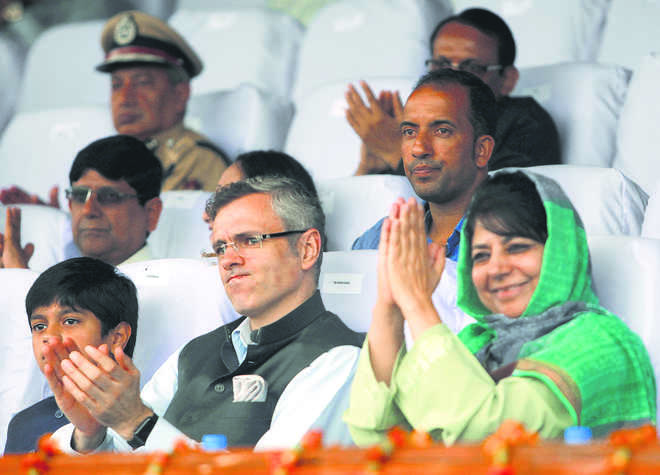
Unfortunate: The Governor has denied political groups that staked claims to form the government an opportunity to do so.
Arun Joshi
Senior Associate Editor
November 21, 2018, will go down in the history of Jammu and Kashmir as a day when Governor Satya Pal Malik dissolved the Assembly without providing an opportunity to the political groups that staked claims to form a government, to show him their roadmap for stability of a new dispensation they were proposing to put in place. That was the bare minimum constitutional requirement that needed to be fulfilled for the maintenance of democratic norms in the state where already there are voices questioning the nation’s democratic credentials. Worse is in store as the people of Kashmir have seen the political mainstream of Kashmir being pushed into an irretrievable corner.
The sequence of events on Wednesday reveals it all. There was buzz about the National Conference, the all-time rival of the PDP, agreeing to join hands with its regional opponent with the help of the Congress — both the NC and PDP have ruled the state previously in alliance withthe the Congress — to form a government.
That it was going to be a reality had become clear a day earlier when PDP stalwart Muzaffar Hussain Baig chastised his party for boycotting the municipal and panchayat polls and declared that he would "seriously consider" joining the third front that Sajjad Lone of the People's Conference was striving to put in place. Baig was a close associate of Sajjad's father Abdul Gani Lone, a politically astute leader and founder of the People's Conference, before he shifted his political arena to the PDP. His statement was a tell-tale story of what was happening behind the scenes.
The media was briefed by the leaders of the two parties. Former Finance Minister Altaf Bukhari, who was tipped to be the new Chief Minister, in his naïve optimism told the media that there would be "good news in the next 24 hours." By the evening, it was clear that the new coalition would stake claim sooner than later.
But after Mehbooba Mufti tweeted that a letter of her party staking claim to form the government was not getting delivered because the "fax machine was not working" at the Raj Bhavan in Jammu, the winter capital, it increasingly became clear that her plea would not be entertained.
The guess was right as something happened in quick succession. Sajjad Lone sent his letter to the Governor, claiming that he had the support of 18 MLAs and also that of the 26 of the BJP. Now the pieces of the puzzle started falling in place: that the PDP-led alliance would not be given a chance. Within the next few minutes, the Raj Bhavan issued a notification saying that the Governor had ordered the dissolution of the Assembly.
Raj Bhavan's reasons for dissolving the House appeared to be a damage-control exercise and a bid to justify that the dissolution was to save the state from political instability. It concluded that "the coming together of such parties in a grouping is nothing but an attempt to gain power rather than to form a responsive government."
If this is going to be the yardstick to allow the formation of a government, then J&K will never have any government as in the given political demography of the state, no single party will ever gain absolute majority in the House to form a government on its own. There have been bitter-sweet coalition experiments in the past, but at the same time, it needs to be recalled that there was a duly elected government with a clear majority in 1984 when the then Governor Jagmohan did when he was told to dismiss the government. Jagmohan did it again when he dissolved the House in February 1990 without exploring the chances of having a political government. His decision cost the state heavily — his attempts to lure the militant outfits to join the electoral battle were frustrated and then the situation turned so bad that parliamentary elections could not be held in the state in 1991 and the Assembly polls had to wait until September-October, 1996.
It is feared that history may repeat itself. Though the situation may not be as bad physically in terms of guns and grenades than it was in the 1990s, there is a much larger resistance block in the Valley and it is spilling over to some mountainous parts of the Jammu region as well. This can cause serious problems that politically blindfolded but ambitious men may not be able to discern. The presence of the third front will be felt only if the existing two fronts — the National Conference and the PDP — regain their relevance. It might not have been the ideal way for the two parties to show their existence, but it was an experiment worth trying, and soon it would have given the proposed third front an opportunity to air its views more forcefully and effectively. But then the whole democratic space for the mainstream has been dirtied with just one decision.
More worrying is the portrayal of the political groups in Kashmir as hurting the security environment. It is a serious charge. It is not without consequences. The statement that the "fragile security scenario in the state of Jammu and Kashmir where there is a need to have a stable and supportive environment for security forces which are engaged in extensive anti-militancy operations and are gradually gaining control over the situation" implies that the political establishment cannot be trusted with the security situation and that its coming into government would be unhelpful. This would push the mainstream political forces to the wall.
This characterisation ignores not only what these parties have done in the past to rebuild the political and democratic structure but also the men and women who have laid down lives since 1989 when militancy took over the Valley.



























